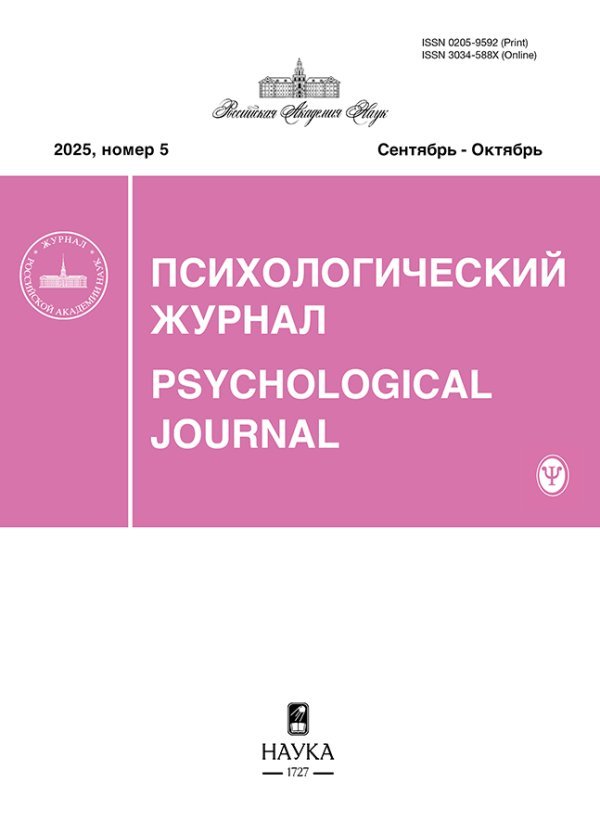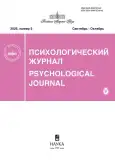Social and psychological problems of integration of modern Russian society
- Authors: Karayani A.G.1, Zhuravlev A.L.2
-
Affiliations:
- Military Academy of the National Guard Troops
- Institute of Psychology of the Russian Academy of Sciences
- Issue: Vol 46, No 5 (2025)
- Pages: 14-22
- Section: Social psychology
- URL: https://stomuniver.ru/0205-9592/article/view/696879
- DOI: https://doi.org/10.31857/S0205959225050029
- ID: 696879
Cite item
Abstract
The article reveals the nature of the influence of the special military operation of Russian troops in Ukraine on the socio-psychological processes in Russian society. On the one hand, an unprecedented consolidation of the core of society is noted, on the other hand, phenomena of social disintegration on its periphery are recorded. It is shown that the status-role structure, relationships, and emotional atmosphere in the families of veterans can be subject to changes. Groups of veterans are distinguished according to the peculiarities of their experience of the psychological consequences of participation in hostilities. The need for socio-psychological reintegration of Russian society at the levels of the entire society, families of veterans of hostilities, and the veterans themselves is substantiated. The need for a comprehensive reintegration of society is substantiated, including socio-psychological readaptation of veterans and their family members, resocialization of veterans and their social environment, psychological rehabilitation of persons subjected to combat and/or psychological trauma.
About the authors
A. G. Karayani
Military Academy of the National Guard Troops
Author for correspondence.
Email: karayani@mail.ru
198206, Saint Petersburg, Pilot Pilyutov str., 1, Russia.
A. L. Zhuravlev
Institute of Psychology of the Russian Academy of Sciences
Email: alzhuravlev2018@yandex.ru
129366, Moscow, Yaroslavskaya str., 13, bldg. 1, Russia.
References
- Andreev A.L., Andreev I.A., Slobodenyuk E.D. Razmezhevanie i konsolidaciya v rossijskom obshchestve v kontekste SVO. Polis. Politicheskie issledovaniya. 2024. № 1. P. 104‒119. URL: https://doi.org/10.17976/ jpps/2024.01.08. EDN: VUHIXY. (In Russian)
- Archana, Dakshi Valia, Updesh Kumar. Sila za uniformoj: rol’ blagopoluchiya sem’i v effektivnosti soldat. Rossijskij voenno-psihologicheskij zhurnal. 2025. №2. P. 84‒93. (In Russian)
- Gavrilov A.V., L’vov S.V., Minchenko E.N., Stulova E.V., Fedorov V.V. Chetyre Rossii: opyt empiricheskoj proverki ekspertnoj modeli segmentacii politicheskih auditorij v kontekste SVO. Monitoring obshchestvennogo mneniya: ekonomicheskie i social’nye peremeny. 2025. № 2. P. 212‒242. URL: https:// doi.org/10.14515/monitoring.2025.2.2775. (In Russian)
- Zhuravlev A.L., Kuprejchenko A.B. Psihologicheskoe i social’no-psihologicheskoe prostranstvo lichnosti: teoreticheskie osnovaniya issledovaniya. Gumanitarnye nauki: teoriya i metodologiya. 2012. № 2. P. 10‒18. (In Russian)
- Zelenova M.E., Lazebnaya E.O. Prishel soldat s fronta... https://psy.su/feed/11662/ (date of request: 02.07.2025). (In Russian)
- Karayani A.G. Hronotop vojny kak metodicheskaya optika dlya analiza pokoleniya special’noj voennoj operacii. Rossijskij voenno-psihologicheskij zhurnal. 2024. № 4(6). P. 53‒64. (In Russian)
- Karayani A.G., Karayani Yu.M., Kijko A.Yu. Psihologicheskaya intervenciya (razvitie, korrekciya, reabilitaciya). Saint Petersburg: VA VNG RF, 2025. (In Russian)
- Karayani Yu.M. Social’no-psihologicheskaya model’ reabilitacii invalidov boevyh dejstvij: monografiya. Moscow: VU, 2015. 132 p. (In Russian)
- Merzlikin N.V., Ivanov A.V. Social’naya konsolidaciya v kontekste special’noj voennoj operacii (ekspertnaya ocenka). Nauka. Kul’tura. Obshchestvo. 2022. V. 28. № 4. P. 85–96. doi: 10.19181/nko.2022.28.4.7. EDN UAVMUR (In Russian)
- Mur B.A., Houpvell A., Grossman D. Posle bitvy: nasilie i voin. Teoriya i praktika zapadnoj voennoj psihologii: psihoterapiya stressovyh rasstrojstv voennosluzhashchih i chlenov ih semej. Ed.: S.E. Zvereva. Saint Petersburg: Aleteya, 2021. P. 39–67. (In Russian)
- Organizaciya okazaniya medicinskoj pomoshchi licam s posttravmaticheskim stressovym rasstrojstvom: metodicheskie rekomendacii. Eds.: N.V. Semenova, A.Yu. Goncharenko, S.V. Lyashkovskaya, M.Yu. Popov, V.K. Shamrej, E.S. Kurasov, A.A. Marchenko, N.G. Neznanov. Saint Petersburg: NMIC PN im. V.M. Bekhtereva, 2022. 36 p. (In Russian)
- Popov V.E. Psihologicheskaya reabilitaciya voennosluzhashchih posle ekstremal’nyh vozdejstvij (Na materiale zemletryaseniya v Leninakane, mezhnacional’nogo konflikta v Fergane i boevyh dejstvij v Afganistane): avtoref. diss. .... kand. psihol. nauk. Moscow, 1992.
- Tarabrina N.V. Praktikum po psihologii posttravmaticheskogo stressa. Saint Petersburg: Piter, 2001. 272 p. (In Russian)
- Tihonova N.E. Ideologicheskaya segmentaciya massovyh sloev naseleniya v usloviyah obostreniya konfrontacii s Zapadom (opyt empiricheskogo analiza). Polis. Politicheskie issledovaniya. 2024. № 5. P. 136–153. URL: https://doi. org/10.17976/jpps/2024.05.09. (In Russian)
- Frimen A., Frimen Sh.M. Faktory uyazvimosti: povyshenie i ponizhenie poroga reagirovaniya. Teoriya i praktika zapadnoj voennoj psihologii: psihoterapiya stressovyh rasstrojstv voennosluzhashchih i chlenov ih semej. Ed.: S.E. Zvereva. Saint Petersburg: Aleteya, 2021. P. 68–87. (In Russian)
- De Groat A.S., Crowley R.P. Looking Critically at Reintegration of Post 9/11 Era Military Veterans // White Paper. Kansas State University. Military affairs. 2013.
- From Tents to Sheets: An Analysis of the CF Experience with Third Location Decompression after Deployment–Report. URL: https://www.canada.ca/en/ombudsman-national-defence-forces/reports-news-statistics/investigative-reports/third-location-decompression/report.html. (date of request: 09.07.2025).
- Harwood-Gross A., Weltman A., Kanat-Maymon Y., Pat-Horenczyk R., Brom D. Peace of mind: Promoting psychological growth and reducing the suffering of combat veterans // Military Psychology. 2022. doi: 10.1080/08995605.2022.2044119.
- Hughes J.G., Earnshaw N.M., Greenberg N., Eldridge R., Fear N.T., French C., Deahl M.P., Wessely S. Use of psychological decompression in military operational environments // Mil Med. 2008. № 173(6). P. 534–538. doi: 10.7205/milmed.173.6.534. PMID: 18595415.
- Irex study on veterans’ reintegration: key needs and challenges in accessing basic services and rights. URL: https://www.irex.org/files/2024-reportveterans-reintergration-english.pdf (date of request: 09.07.2025).
- Kennis M., Te Brake H. Facilitating the transition home after military deployment: a systematic literature review of post-deployment adaptation programmes // European Journal of Psychotraumatology. 2022. V. 26. № 13 (1). Art. 2073111. doi: 10.1080/20008198.2022.2073111. PMID: 35957632; PMCID: PMC9359196.
- Land post-operational stress management (POSM). Land forces standing order № 3209. 2014.
- Matthews M.D. Head strong: How Psychology revolutionizing War. N.Y.: Oxford university press, 2014. P. 77‒79.
- Sayers S.L. Family Reintegration Difficulties and Couples. Therapy for Military Veterans and Their Spouses Publication // Cognitive and Behavioral Practice. 2011. № 18. P. 108–119.
- Schell T.L, Farris C., Miles J.N.V., Sloan J., Scharf D.M. The Air Force Deployment Transition Center: Assessment of Program Structure, Process, and Outcomes // Rand Health Q. 2017. V. 1. № 7 (1). Art. 7. PMID: 29057157; PMCID: PMC5644773.
- Sherman M.D., Hawkey K.R., Lynne M. Borden L.M. The Experience of Reintegration for Military Families // Department of Family Social Sciences, Center for Research and Outreach, University of Minnesota. 2015. URL: https://www.ncfr.org/ncfr-report/focus/family-focus-conflict-violence-and-war/experience-reintegration-military-families (date of request: 09.07.2025).
- Tedeschi R.G. Growth After Trauma //Harvard Business Review. 2020. URL: https://hbr.org/2020/07/growth-after-trauma (date of request: 06.03.2025).
- Vermetten E., Greenberg N., Boeschoten M.A., Delahaije R., Jetly R., Castro C.A., McFarlane A.C. Deployment-related mental health support: comparative analysis of NATO and allied ISAF partners // European Journal of Psychotraumatology. 2014. № 5 (1). Art. 23732. doi: 10.3402/ejpt.v5.23732.
Supplementary files










